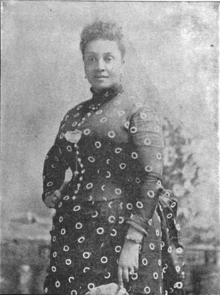Georgia Gordon Taylor
Georgia Gordon Taylor (née Georgia Gordon; 1855 - June 7, 1913) was an American soprano singer from the U.S. state of Tennessee. She was the leader of the "Original Fisk Jubilee Singers".

Biography
Georgia Gordon was born in Nashville, Tennessee in 1855. Her mother, Mercy Duke Gordon (1833-1890), was mulatto, and her father, George Gordon (1830-1870), was a slave. She had a half-sister, Elwin (born 1848).[1] Taylor's cousin, Adelaide Allen, was the mother of Howard University professor Sterling Allen Brown.[2]
In her youth, Taylor did not receive an education, but learned to read by studying the Bible.[3] She arrived at Fisk University in 1868, studying literature under Helen Clarissa Morgan,[4] and music with George L. White. In 1872, she became a Jubilee Singer, being one of the early singers who toured the US and Europe in 1872-73, with an appearance before Queen Victoria when they were in England.[1][5] For seven successive years of almost continuous labor, she was the group's leader, traveling extensively in the interest of Fisk University, giving popular entertainments of a species of singing which originated among the slaves of the South. She possessed a soprano voice of rare quality that was pleasing and in demand.[6]
After retiring from public life, she married Preston Taylor, founder of Greenwood Cemetery and minister of the Lee Avenue Christian Disciples of Christ Church at Nashville. She did church work alongside him.[5] Their only child, Preston G. Taylor (1890-91) died age seven months.[1]
Taylor died in 1913 in Nashville,[7] and was buried in Greenwood Cemetery, a plaque commemorating that she was an original Fisk Jubilee Singer. She was posthumously awarded a bachelor's degree by Fisk University in 1978.[1]
References
- Bragg, Emma W. "Georgia Gordon Taylor (1855-1913)". Tennessee State University. Retrieved 11 February 2017.
- Gabbin 1994, p. 19.
- Morgan 2010, p. 50.
- Bontemps 2002, p. 237.
- Haley & Washington 1895, p. 222.
- Haley 1897, p. 75-76.
- Abbot & Seroff 2013.
Attribution


Bibliography
- Abbot, Lynn; Seroff, Doug (2013). To Do This, You Must Know How: Music Pedagogy in the Black Gospel Quartet Tradition. Univ. Press of Mississippi. ISBN 978-1-61703-675-0.CS1 maint: ref=harv (link)
- Bontemps, Arna (2002). Chariot in the Sky: A Story of the Jubilee Singers. Oxford University Press. ISBN 978-0-19-515658-4.CS1 maint: ref=harv (link)
- Gabbin, Joanne V. (1994). Sterling A. Brown: Building the Black Aesthetic Tradition. University of Virginia Press. ISBN 978-0-8139-1531-9.CS1 maint: ref=harv (link)
- Haley, James T.; Washington, Booker T. (1895). Afro-American Encyclopaedia, Or, The Thoughts, Doings, and Sayings of the Race: Embracing Addresses, Lectures, Biographical Sketches, Sermons, Poems, Names of Universities, Colleges, Seminaries, Newspapers, Books, and a History of the Denominations, Giving the Numerical Strength of Each. In Fact, it Teaches Every Subject of Interest to the Colored People, as Discussed by More Than One Hundred of Their Wisest and Best Men and Women. Illustrated with Beautiful Half-tone Engravings (Public domain ed.). Nashville, Tennessee: Haley & Florida. p. 222.CS1 maint: ref=harv (link)
- Haley, James T. (1897). Sparkling Gems of Race Knowledge Worth Reading: A Compendium of Valuable Information and Wise Suggestions that Will Inspire Noble Effort at the Hands of Every Race-loving Man, Woman, and Child (Public domain ed.). J.T. Haley 6 Company.CS1 maint: ref=harv (link)
- Morgan, Robert J. (2010). 100 Bible Verses Everyone Should Know by Heart. B&H Publishing Group. ISBN 978-0-8054-4682-1.CS1 maint: ref=harv (link)